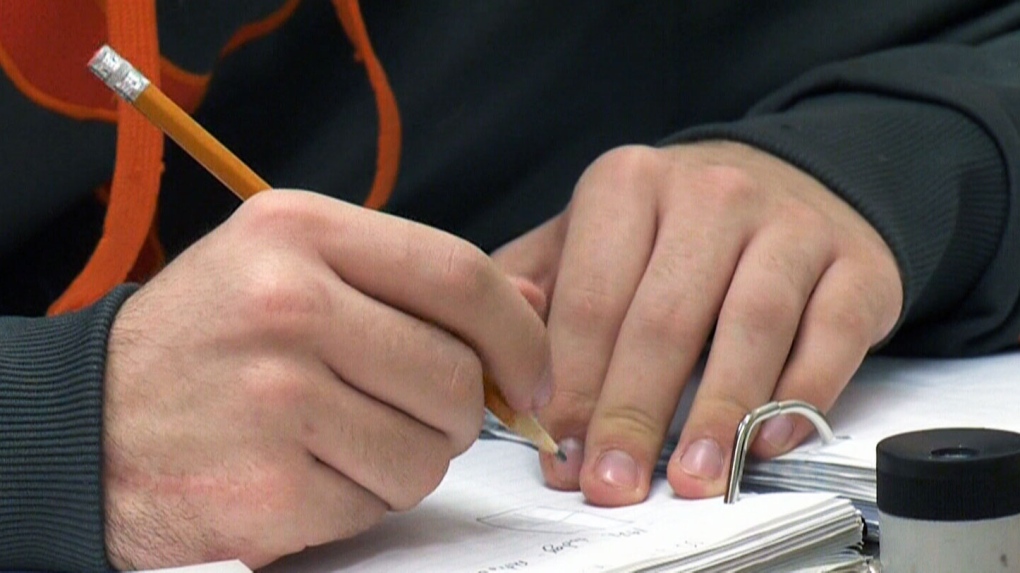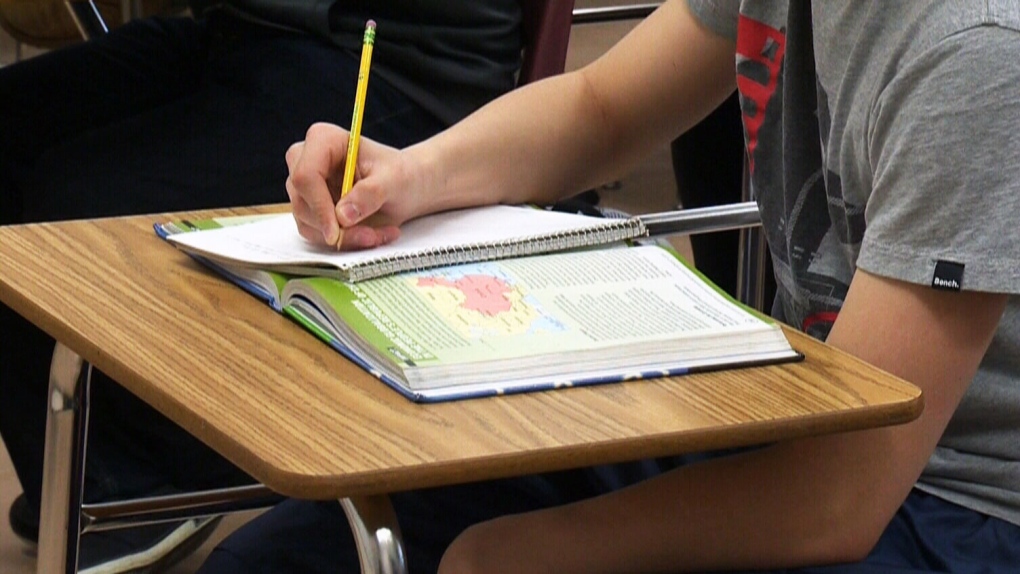N.W.T to complete curriculum transition by 2028, a 'sad commentary' for Alberta
After using Alberta's education curriculum since the 1950s, the Northwest Territories has outlined the timeline it will use to pivot toward British Columbia's program of studies.
Slated to be completed by 2027-28, the N.W.T. curriculum change comes as Alberta drafts a new program of study for all subject areas. New math and English courses are being piloted to K-3 students in Alberta, with students in Grades 4 to 6 learning those revised subjects this fall.
- Alberta Education to begin piloting science, French curricula in September
- Alberta announces 3 phases for curriculum rollout as criticism continues
- Edmonton Catholic teachers learn new curriculum ahead of first day of school
Before each subject is officially implemented in classrooms, the N.W.T. says it will be closely reviewed and adapted to ensure its relevancy and feedback from teachers is taken into consideration.
"B.C.'s education system is well regarded as a high-performing system," reads the N.W.T.'s curriculum renewal website. "This all results in students being more prepared for life after high school."
The decision to pivot to B.C.'s curriculum was based on extensive research, analysis and more than 40 consultation sessions with education leaders and Indigenous governments, explained Agata Gutkowska, an N.W.T cabinet spokesperson.
"B.C. is one of the top performers in education among all the provinces," Gutkowska added in a statement.
"Its curriculum is one of the first in Canada to focus on competency-based learning and it aims to personalize learning, making it more student-centred and flexible," she added.
"With an emphasis on Indigenous knowledge and a focus on literacy and numeracy skills, we believe the B.C. curriculum will benefit N.W.T's junior kindergarten (JK) to Grade 12 students."
By the end of May 2023, the N.W.T. anticipates it will have revised Grade 12 graduation requirements taking into account B.C. courses, a schedule for teacher training on the new material, and draft curriculums for Grades 4-6 and 9.
"As this is a significant change for schools and teachers, education body staff, educators and the N.W.T Teachers' Association requested that teachers have the opportunity to ‘trial’ the curriculum before full implementation to ensure they’re not overwhelmed with the transition," the territory says.
The curriculum trials will begin in 2023-24 for Grades 4 to 6, with a draft curriculum for all subjects expected the following year. In 2025-26, JK, kindergarten and Grades 1 to 3 will trial the new teaching regimen.
Grades 7-8 will also trial their curriculum in 2023-23, with a finalized version expected two years later. High school subjects will be implemented over three school years starting in 2024-25.
The last year of Alberta diploma exams for Grade 12 N.W.T. students will be 2025-26, with B.C. assessments fully integrated into classrooms by 2027-28.
ALBERTA CONSIDERED COMPETENCY-BASED LEARNING
A pair of education and curriculum experts are disappointed that previous direction from the Ministry of Education – looking to modernize how Alberta students were learning, which has since been revised – is now part of the reason why the N.W.T. is switching curriculums.
Long before the new curriculum developed under the United Conservative Party, elementary education expert Dr. Carla Peck said Alberta was considering adding competency-based learning to classrooms.
Peck, a University of Alberta social studies education professor and curriculum expert, explained competencies as life skills learned as students engage with subject topics.

As an example, Peck offered students learning about different Canadian prime ministers and then asked in an assignment to select which was the most significant to Canada.
"All of that they would learn in social studies," she said. "Then use all of that to be able to orient themselves today. It helps them think critically and historically. They take that information and apply it and have to weigh the criteria of what makes them the most significant. What does significance mean and to whom?"
Instead of just memorizing facts and dates, Peck says competencies apply knowledge so that students better retain it.
"It's not only about what factual knowledge students are able to remember but what can they do with that knowledge," she said. "What skills can they develop to take that knowledge and create something new out of that knowledge, rather than just regurgitating it back just for the sake of knowing something."
- 'A political football': Concern over Alberta's premier pushing U.S.-style views on school curriculum
- 'Looks like something from the 1950s': Ditch the Draft protests held across Alberta
In 2010, competencies were introduced in the province's blueprint for future education system changes. Five years later, then-education minister David Eggen announced that competencies would be embedded in subjects as part of a curriculum update. In the new curriculum under the UCP, their intent has been redefined.
Alberta's draft K-6 curriculum lists general skills students at particular ages are expected to gain through "competency progressions," including:
- critical thinking;
- problem solving;
- research and managing information;
- creativity and innovation;
- communication;
- collaboration;
- citizenship; and
- ersonal growth and well-being.
In comparison, B.C.'s curriculum has common core competencies that are then specifically incorporated into each subject through the learning of content and sample topics.
For example, Grade 3 students in B.C. taking Social Studies are not only to learn about events or places but to ask questions or draw conclusions on why those events or places are significant and suggest lessons that can be learned today.
"Alberta was poised to be a leader in the competency-driven path to curriculum development, and now Alberta has abandoned that completely," she told CTV News Edmonton.
"Instead, other jurisdictions are looking to B.C. and elsewhere as leaders istead of Alberta," Peck added. "Which is a really sad commentary about what the current government has done to Alberta's reputation in education."
- NDP upset new Grade 3 social studies less focused on Ukraine; UCP says they're making it political
- UCP government pushing ahead with new curriculum, ATA president calls for process to 'stop'
DRAWBACK TO 'KNOWLEDGE-RICH CURRICULUM'
Amy von Heyking, a University of Lethbridge education professor, says a key difference between B.C.'s curriculum and Alberta's – and which she believes likely appealed to the N.W.T. government – was its focus on different perspectives and ways of learning.
"There's a more reasonable balance between the articulation of clear knowledge outcomes, an indication of what students need to do with that — with the core competencies — and then big ideas," von Heyking explained. "For deep understanding, you apply that knowledge. Use it to solve problems."

Alberta's new curriculum, on the other hand, focuses on "content-heavy" and "knowledge-rich" lists of concepts students must be familiar with, she said.
"And don't get me wrong, we need our students to know important information, to be able to think critically about it and with it," von Heyking explained.
While core skills like critical thinking and problem-solving are mentioned in some of the draft curricula, von Heyking says there is a difference between listing them as an expected outcome and embedding them in ways of learning.
"The issue is that it can't just be about repeating or recalling or retrieving information," she explained. "A program of studies or a curriculum isn't something that teachers do to students, it's something they live with them in classrooms."
A LOSS OF COLLABORATION
While N.W.T. did not pay to use Alberta's learning materials, von Heyking said it choosing another jurisdiction's curriculum is a loss to Alberta students and educators.
"We were partners," she said. "Not just in the sense that they took our program. They were part of the process of developing it."
"I think part of the reason for their concern and reluctance to move forward is not just a concern about the product that we have now," she added. "The fact that they weren't invited to the table, can't be helping."
In Peck's view, N.W.T.'s roadmap for learning material renewal stands in stark contrast to how Alberta is implementing its new curriculum.
"The plan for implementation that the Northwest Territories has laid out is really exactly what a curriculum implementation plan should look like," Peck said, adding that there are opportunities for teacher feedback, transparency about material and engagement with stakeholders.
"It also tells me that they are going to be collecting data and feedback throughout the process so that they can refine and revise," she said.
"It speaks volumes about the quality of the curriculum that has been and is being developed under the current UCP government," Peck echoed. "This decision by the N.W.T. echoes many of the criticisms that have been raised for two years now."
- 'Not suitable': Teachers report slams Alberta’s draft curriculum
- 'Slow down and work together': UCP MLA Tracy Allard writes letter to education minister about draft curriculum
While the province has been "happy to partner" with the N.W.T in the past, it is now focused on Alberta students, said Emily Peckham, Alberta Education Minister Adriana LaGrange's press secretary.
"We understand that the Northwest Territories are making significant shifts in their education system as part of their efforts to improve student outcomes," Peckham told CTV News Edmonton in a statement.
"After years of declining outcomes here in Alberta, we are doing the exact same thing through our curriculum renewal process. While it is unfortunate that their final decision was made prior to the finalization of the draft K-6 curriculum, we understand their decision to move quickly and partner with a province that has a finalized and implemented K-12 curriculum."
CTVNews.ca Top Stories

Quebec nurse had to clean up after husband's death in Montreal hospital
On a night she should have been mourning, a nurse from Quebec's Laurentians region says she was forced to clean up her husband after he died at a hospital in Montreal.
Northern Ont. lawyer who abandoned clients in child protection cases disbarred
A North Bay, Ont., lawyer who abandoned 15 clients – many of them child protection cases – has lost his licence to practise law.
Bank of Canada officials split on when to start cutting interest rates
Members of the Bank of Canada's governing council were split on how long the central bank should wait before it starts cutting interest rates when they met earlier this month.
Maple Leafs fall to Bruins in Game 3, trail series 2-1
Brad Marchand scored twice, including the winner in the third period, and added an assist as the Boston Bruins downed the Toronto Maple Leafs 4-2 to take a 2-1 lead in their first-round playoff series Wednesday
Cuban government apologizes to Montreal-area family after delivering wrong body
Cuba's foreign affairs minister has apologized to a Montreal-area family after they were sent the wrong body following the death of a loved one.
'It was instant karma': Viral video captures failed theft attempt in Nanaimo, B.C.
Mounties in Nanaimo, B.C., say two late-night revellers are lucky their allegedly drunken antics weren't reported to police after security cameras captured the men trying to steal a heavy sign from a downtown business.
What is changing about Canada's capital gains tax and how does it impact me?
The federal government's proposed change to capital gains taxation is expected to increase taxes on investments and mainly affect wealthy Canadians and businesses. Here's what you need to know about the move.
New Indigenous loan guarantee program a 'really big deal,' Freeland says at Toronto conference
Canada's Deputy Prime Minister Chrystia Freeland was among the 1,700 delegates attending the two-day First Nations Major Projects Coalition (FNMPC) conference that concluded Tuesday in Toronto.
'Life was not fair to him': Daughter of N.B. man exonerated of murder remembers him as a kind soul
The daughter of a New Brunswick man recently exonerated from murder, is remembering her father as somebody who, despite a wrongful conviction, never became bitter or angry.
































